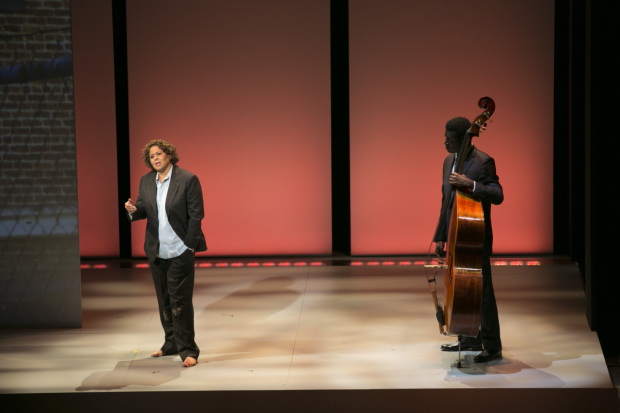Notes from the Field: Doing Time in Education

(© Evgenia Eliseeva)
Anna Deavere Smith is back where she belongs: onstage and speaking out about one of the most divisive problems in contemporary America. In her newest solo show Notes From the Field: Doing Time in Education (with composer Marcus Shelby providing accompaniment), Smith takes on the many voices of victims, perpetrators, helpless administrators, and citizens with good intentions who have witnessed the path from public school to prison that becomes the itinerary for too many of our disadvantaged (and mostly minority) children. In a summer that has seen more black men dead after police interventions, Smith argues that the fault lies in many areas, starting with our broken system of public education.
Smith employs the same manner of storytelling she used in her previous works — Twilight: Los Angeles, Fires in the Mirror, and Let Me Down Easy, with one difference. Rather than a post-show talkback, the audience is divided into discussion groups led by facilitators during a long intermission. Smith returns for a coda at the end.
Based on several years of research and more than 250 interviews with various stakeholders, Smith has culled their conversations into templates for the characters she becomes to tell their stories. Smith is chameleon-like in the way she revolves from one character to the next, assuming a different vocal delivery, posture, and body language, with only a modicum of costume changes. The intensity of her emotion as she embodies anger, resignation, determination, and her empathy for the fallen, make Smith an eloquent spokesperson to spotlight the miscarriages of justice and call for change.
One of the earliest characters we meet is Taos Proctor, a Yorok Tribal member, who was expelled from every school he attended, to wind up countless times in jail. He speaks in a country patois, thumbs hitched in a pair of bright orange fishing trousers. The parade of characters continues, from Kevin Moore who videotaped the police beating Freddy Gray, who died at their hands in Baltimore; to Jamal-Harrison Bryant, the evangelical pastor who exhorted the audience at Grays's funeral; and Steven Campos, a former inmate who managed to turn his life around (albeit while working as a dishwasher in Los Angeles). Smith ranges far and wide in contemporary America, where police officers with attitudes are stationed in the schools, having replaced the compassion of guidance counselors and principals. Too many minority children, disciplined for minor misbehaviors, are expelled and/or sent to juvenile detention. The result is often a direct path into a life of drugs and crime.
Backed by still photos and videos projected on six screens that rise and lower in various configurations, Smith builds an alarming picture of the hopelessness among the students in too many schools. After an hour and 45 minutes of stage time, the audience was dismissed into discussion groups which were allotted 25 minutes. Many in the group to which I was assigned—randomly—were teachers. Our conversation was politically correct, laden with good will but offering few insights or realistic solutions. Whether this model for immersive theater produces solutions to the problems or corrective responses is unknown, but Smith is determined that viewers not remain bystanders while she "runs off" her mouth.
The evening ends with an optimistic coda as Smith portrays Georgia Democratic Congressman John Lewis — who was badly beaten during the March on Selma but has now received and accepted apologies, and tears, from a policeman who was present at Selma — and the Klan member who beat him.
The production now running at American Repertory Theater is a tryout before an October opening in New York at Second Stage Theatre. Perhaps director Leonard Foglia will help Smith sharpen her focus to include more school incidents rather than the extended attention to the murder of Freddy Gray, which, terrible as it was, is a disconnect with Smith’s main through-line concerning public education. However, Smith's eloquence and passion in the face of injustice is strong as ever. Notes from the Field points out the continuing racism that fuels the failure to educate all of our children, keep them from harm, and prepare them for a future of opportunity.











